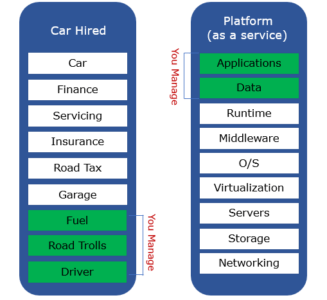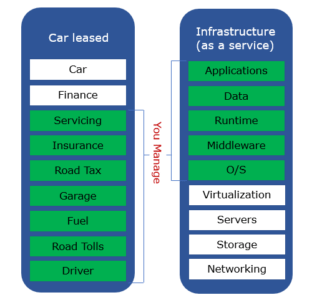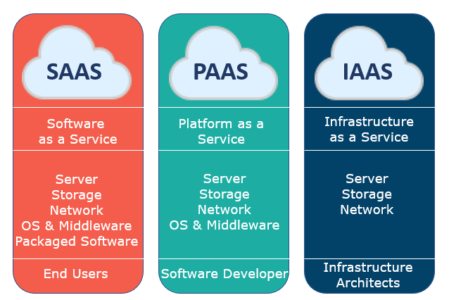AWS Certification Training
- 181k Enrolled Learners
- Weekend/Weekday
- Live Class
“Cloud computing is not only the future of computing, but the present and the entire past of computing.” says Ellison,Co-founder and former CEO of Oracle. ‘Cloud Computing’ has become quite a buzzword these days. It has evolved from personal cloud storage to organizations moving their entire data to the cloud. We can see acceleration in the adoption of Cloud Computing Services every year, a trend that won’t cease anytime soon.
Before that, let me give you a quick insight as to what you will be learning in this blog. I will be covering the below mentioned topics in detail.
Let’s get started!
Cloud Computing in layman terms refers to computing over the internet. In other words, it provides a means for you to store/access your data and applications over the internet.
Cloud Computing can be defined as a model that delivers on-demand, self-sufficient Cloud Computing Services like:
through a Wide Area Network(WAN) or dedicated network. Users can utilize these services with a little or no interaction with service providers.
We have some major companies delivering the Cloud Computing Services. Some notable examples include the following:
Now the way these different Cloud Computing Services are delivered to users differ based on user’s requirements. Cloud Computing provides users with three distinctive types of Cloud Computing Services via the internet.
First let us go through the definition of each Cloud Computing Service type:
Saas provides clients with ability to use software applications over the internet via subscription basis. Clients can access applications from anywhere via web.
Examples: Google Applications and Salesforce.
PaaS provides a platform where the clients can deploy their own applications and host them. The client is free from hassles of setting up infrastructure, managing storage, servers, network etc.
Examples: Amazon Web Services and Rackspace.
The IaaS provides just the hardware and network, the clients should install and develop software and applications.
Examples: IBM, Google and Amazon Web Services.
Now that we have gone through the definition, let us go ahead and understand each of these Cloud Computing Services in detail with the help of a use case. Consider a scenario where you have made travel plans. And you have decided car as your mode of transport. Now based on your requirements you have 4 options to choose from. Those are:
Use case: Suppose you choose to take a taxi, the car agency is responsible for car finance, servicing of the car. Besides that they take care of insurance and road tax. The driver, fuel requirements is taken care as well. You just need to pay for your ride.
Similarly Software-as-a-Service provider delivers software applications over the Internet, on demand and basically on a subscription basis. You just need to pay for the service you are utilizing. Entire software and hardware stack is hosted by the provider and made available to users over the Wide Area Network(WAN) like Internet or other dedicated networks.
SaaS eliminates the need for hardware acquisition, provisioning and maintenance, as well as software licensing, installation and support. Provides scalability, flexible payments and auto updates.
Redefine Your Career with Cutting-Edge Cloud Architect Certification Training!
Use case: You plan to travel to a nearby place so decided to rent a car, then you might have to take care of fuel needs, road tolls and hire a driver as well. Rest of the work like finance of the car, car service, insurance, road tax, garage etc is responsibility of the car renting agency.
Likewise Platform-as-a-Service provider offers core computing services like storage, virtualization and network. In addition, hosts OS, middleware frameworks or other development services such as web services, database management system and SD’kits compatible with various programming languages. The service provider builds and renders a secure and optimized environment on which users can install applications and data sets.
The prime benefits of this type of service include its simplicity and convenience for users–the Platform-as-a-Service users can focus on creating and running applications rather than constructing and maintaining underlying infrastructural stack and services.
Cloud Computing Service Models

Use case: You made long travel plans to a far away place so chose to lease a car. Here you have to worry about servicing a car, road tax, insurance and garage requirements, pay for the fuel, road tolls and hire a driver. Most of the work is done by you. The car agency takes care of just the finance related to leasing a car.
Similarly Infrastructure-as-a-Service provider offers end users with bare computing resources like storage capacity, virtualization, networking, security and maintenance on a pay-as-you-use basis. The users are no longer concerned with location and purchase costs. Furthermore IaaS provider supplies additional services that complement the above features like load balancing, billing details, data backup, recovery and storage.
IaaS model users handle most of the workload like installing, maintaining and managing software layers.
Example: Amazon AWS, Rackspace, Flexiscale and Google Cloud Platform are some well known IaaS providers.

The below picture summarises what we have learnt about cloud computing services.

There are certain features that all these three Cloud Computing Service models have in common. Some of them are listed below.
The cloud service provider purchases, hosts and maintains either a part or complete infrastructure stack, necessary software and hardware in their own facility. As a result service users are spared from the complexity of dealing with the hardware and software on-premise.
Service users can just pay for the resources and services they use. By doing so they can maximise the cost savings unlike in traditional approach where the user has to pay complete cost irrespective of usage.
Cloud computing service providers usually provide the infrastructure in such a way so as to meet the increasing demands. The resources can be scaled up and scaled down according to enterprise requirements.
Cloud computing makes it possible to move data easily. Even more, the cloud computing service users need not worry about losing the data since cloud provides with multiple data backups.
The end users can scale up and scale down resources depending on their business needs, update the services they are currently using, manage the billing details etc with little or no interaction with the cloud provider.
We have learnt about different Cloud Computing Services and their features. Usually these Cloud Computing Services are made available to users via various deployment models. Each deployment model is identified with specific features that support the user’s requirement of services. Let us learn about types of Cloud Deployment Models in detail. Check out our Azure Cloud Certification masters program today!
There are 3 fundamental Deployment Models of cloud computing: Public Cloud, Private Cloud and Hybrid Cloud.
In Public Cloud model, services and infrastructure are hosted on premise of cloud provider and are provisioned for open use by general public. The end users can access the services via public network like internet. Public Cloud services are delivered mostly on demand. Popular for hosting everyday apps like email, CRM and other business support apps.
Public Cloud model offers high scalability, automated maintenance but more vulnerable to attacks due to high levels of accessibility.
Common Public Cloud providers include Amazon Web Services and Microsoft Azure. You can even check out the details of Azure with the Azure Course.
Private Cloud model provides cloud services and infrastructure exclusively to a single tenant. The tenant can control and customize it to his need. The cloud infrastructure can be monitored either by cloud provider or the tenant. Many companies are migrating their data centers to Private Cloud to run core business fields like research, manufacturing human resource etc.
The Private Cloud model offers great levels of security and control, though cost benefits ought to be sacrificed to some extent.
Common Private Cloud providers include VMware and Openstack.
Hybrid Cloud
As the name suggests Hybrid Cloud is composition of both Public Cloud and Private Cloud infrastructure. The company can use Private Cloud to run mission critical operations and Private Cloud to run non sensitive high demand operations.
The companies using Hybrid Cloud model benefit with the security and control aspect of Private Cloud and off-hand management and cost benefits of Public Cloud.
And I hope you have enjoyed reading this blog. Now you know what Cloud Computing is and what are its different Services. To get in-depth knowledge on Cloud Computing and take your skills to the next level, you can enroll for the Cloud Computing Online Course by Edureka. If you have any questions please mention it in the comments section of this Cloud Computing Services blog and we will get back to you as soon as possible.
 Thank you for registering Join Edureka Meetup community for 100+ Free Webinars each month JOIN MEETUP GROUP
Thank you for registering Join Edureka Meetup community for 100+ Free Webinars each month JOIN MEETUP GROUPedureka.co